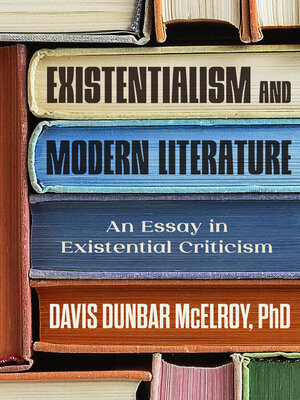Existentialism and Modern Literature
ebook ∣ An Essay in Existential Criticism
By Davis Dunbar McElroy

Sign up to save your library
With an OverDrive account, you can save your favorite libraries for at-a-glance information about availability. Find out more about OverDrive accounts.
Find this title in Libby, the library reading app by OverDrive.



Search for a digital library with this title
Title found at these libraries:
| Library Name | Distance |
|---|---|
| Loading... |
These three essays—originally written in the 1960s as lectures—show how novels, poems, and plays confront thephilosophicalcomplexities of humanity’s existence.
Our self-awareness—the very thing that makes us human—also makes us realize our powerlessness and the limitations of our existence. This concept is explored in this thought-provoking guide and provides a jumping off point for this treatise on existentialism and literature.
Davis D. McElroy examines how modern art—the unharmonious, corrupt, dismal, and shattering effect of much of humanity’s painting, music, and literature—can be traced to the existentialist view of existence. McElroy uses the works of such American authors as John Steinbeck, Arthur Miller, Tennessee Williams, and William Faulkner—as well of those of Kafka and Ibsen—to show that literature is the work of desperate men, whose anguish and despair have driven them to see further and more clearly than is possible for most, and their warnings must be heeded.
To be able to live in the chaos of the modern world, many authors have turned to existentialism as a guide, according to McElroy. Using T. S. Eliot’s The Wasteland and his plays The Confidential Clerk and The Cocktail Party as examples, McElroy posits that these authors are ultimately teaching us that we must learn to live authentically, or we will not live at all; we must choose the good that is in us, or be engulfed in the evils that surround us. This is the simple message which modern writers—as well as the philosophers of existentialism—are trying so desperately to bring to our attention.
Our self-awareness—the very thing that makes us human—also makes us realize our powerlessness and the limitations of our existence. This concept is explored in this thought-provoking guide and provides a jumping off point for this treatise on existentialism and literature.
Davis D. McElroy examines how modern art—the unharmonious, corrupt, dismal, and shattering effect of much of humanity’s painting, music, and literature—can be traced to the existentialist view of existence. McElroy uses the works of such American authors as John Steinbeck, Arthur Miller, Tennessee Williams, and William Faulkner—as well of those of Kafka and Ibsen—to show that literature is the work of desperate men, whose anguish and despair have driven them to see further and more clearly than is possible for most, and their warnings must be heeded.
To be able to live in the chaos of the modern world, many authors have turned to existentialism as a guide, according to McElroy. Using T. S. Eliot’s The Wasteland and his plays The Confidential Clerk and The Cocktail Party as examples, McElroy posits that these authors are ultimately teaching us that we must learn to live authentically, or we will not live at all; we must choose the good that is in us, or be engulfed in the evils that surround us. This is the simple message which modern writers—as well as the philosophers of existentialism—are trying so desperately to bring to our attention.







